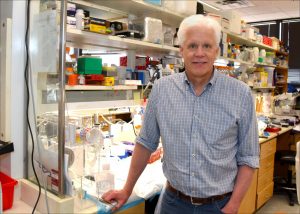Vertex Enters Duchenne Therapy Market with $1B Acquisition of Exonics
Written by |

Eric Olson co-founded Exonics Therapeutics in 2017 with funding from Cure Duchenne. Exonics has just been acquired by Vertex. (Photo courtesy of UT-Southwestern)
Move over, Sarepta Therapeutics, Solid Biosciences, PTC Therapeutics and Pfizer.
Vertex Pharmaceuticals, which dominates the cystic fibrosis drug market, has just entered the multibillion-dollar race to find effective treatments — and maybe even cures — for two other rare diseases: Duchenne muscular dystrophy (DMD) and myotonic dystrophy type 1 (DM1).
The Boston-based giant will spend up to $2 billion on two deals. The first involves plans to acquire Exonics Therapeutics for roughly $1 billion, including $245 million to Exonics equity holders upfront, and potential future payments totaling $750 million for achieving development and regulatory milestones tied to the company’s DMD and DM1 programs.
That transaction, expected to close by the end of September, will make Exonics a wholly-owned subsidiary of Vertex.
In the second business deal, Vertex has agreed to pay $175 million upfront for exclusive worldwide rights to existing and future intellectual property of Switzerland’s CRISPR Therapeutics, and $1 billion payments tied to meeting research and development, regulatory, and commercial milestones for Duchenne and DM1 therapies.
The nonprofit group Cure Duchenne and Eric Olson, PhD, of the University of Texas Southwestern Medical Center, co-founded Exonics in February 2017. Based in Watertown, Massachusetts, the company pioneered SingleCut CRISPR/Cas9 gene editing technology with the goal of producing drugs by repairing the mutations that cause Duchenne.
Vertex: ‘A proven track record’
“These transactions are highly aligned with our strategy of investing in scientific innovation to create transformative medicines for people with serious diseases,” Vertex President and CEO Jeffrey Leiden, MD, said in a June 6 press release. “We are thrilled to work with Exonics and the entire Duchenne community to advance the promising science that Eric and his team have developed to change the course of this devastating disease.”
Olson declined comment for this story, but said in a prepared statement that “Vertex has a proven track record of developing important therapies for serious diseases, and we are excited to combine our efforts to potentially develop a safe and efficacious one-time treatment for severe neuromuscular diseases.”
The company’s three available therapies for cystic fibrosis — a severe progressive disease caused by mutations in the CFTR gene that affects about 30,000 Americans — are Kalydeco (ivacaftor), Orkambi (ivacaftor/lumacaftor) and Symdeko (tezacaftor/ivacaftor).
Last year, the trio generated a combined $3 billion in revenues for Vertex — up 40% from 2017 sales — with Orkambi comprising 41.5% of the total, followed by Kalydeco (33.2%) and Symdeko (25.3%).
Debra Miller, co-founder and president of Cure Duchenne, said the decision by Vertex to pursue Duchenne therapies “is a big deal, and for lots of reasons.”
“We’ve been talking to Vertex for a long time about them hopefully getting into the Duchenne field, because they have such a great track record with cystic fibrosis,” Miller told Bionews Services, which publishes this website, by phone from Los Angeles. “They reached out to us, but it was very clear that they only wanted to go into the Duchenne space if they had a disease-modifying therapy that would be truly impactful.”
‘Raising the visibility’ of DMD
Cure Duchenne originally committed $5 million to Exonics, Miller said, “because none of the other organizations were interested, so we ended up funding it by ourselves.”
The group invested $2 million in Exonics, but in November 2017 — before it could pay the remaining $3 million — The Column Group, a science-driven venture capital firm, poured $40 million in Series A funding into the venture.
Miller said the latest deal with Vertex “raises the visibility of Duchenne and shows that significant investments can be made” in DMD.
“It’s good from all fronts, and we’re really excited because Vertex has been successful at getting drugs approved, and they have had success working with regulators,” she said. “They have the resources to take this CRISPR gene editing technology into the clinic if it proves to be safe and effective. We still don’t know about that, but I think if anybody can do it, it’s Vertex.”
Equally enthused is Pat Furlong, co-founder and president of the nonprofit group Parent Project Muscular Dystrophy.
“We are thrilled for the Exonics-Vertex relationship, as it will accelerate the progress of CRISPR as a potential treatment,” she told us. “Our goal in all of this, as therapies emerge, is to make sure every individual who is eligible for these therapies has access to them.”








